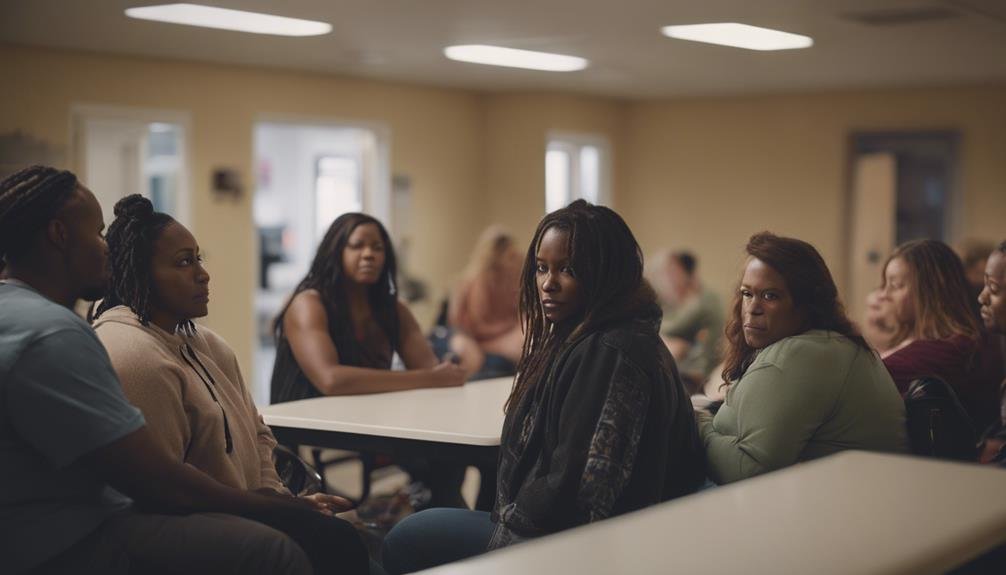If you’re in a situation of domestic abuse, safety planning is key. Reach out to the National Domestic Violence Hotline at 800-799-7233 for help. Create a safety plan with escape routes and safe spaces. Seek legal aid to understand your rights and secure protection orders. Counseling provides a safe space to heal and develop coping skills. Emergency shelters offer immediate refuge and support. Trusted friends and family can offer emotional support. Remember, help is available when you need it the most.
Key Takeaways
- Develop a detailed safety plan with a trusted advocate.
- Contact the National Domestic Violence Hotline for immediate support.
- Seek legal aid for protective orders and custody arrangements.
- Attend counseling for emotional healing and coping strategies.
- Utilize community resources like emergency shelters and support groups.
Safety Planning
When facing domestic abuse, prioritizing safety planning is vital to protect yourself and prepare for emergencies. Creating a safety plan tailored to your specific situation can greatly increase your chances of staying safe.
One invaluable resource to assist you in this process is the National Domestic Violence Hotline. By reaching out to the hotline, you can access professional support and guidance to help you develop a detailed safety plan.
Safety planning involves identifying safe spaces in your home, establishing communication strategies with trusted individuals, and preparing essential items like important documents and emergency funds. It’s important to have a plan in place to navigate dangerous situations and seek help when needed.
With the assistance of professionals and support networks, you can empower yourself with practical tools to enhance your safety and well-being.
Helpline Support
Utilize the National Domestic Violence Hotline for immediate and confidential support if you’re a victim of domestic abuse. This hotline, available 24/7 at 800-799-7233, connects you with trained advocates who offer essential information, safety planning, and assistance in multiple languages. Funded by grants from government agencies, the National Domestic Violence Hotline guarantees that survivors like you receive the help and support you need.
When you reach out to the National Domestic Violence Hotline, you’re taking an essential step towards your safety and well-being. The advocates on the other end of the line are there to listen, provide guidance, and support you through this challenging time. Remember, you aren’t alone in this, and help is just a phone call away.
Legal Assistance
If you’re a survivor of domestic abuse, seeking legal assistance can provide essential support in understanding the complexities of the legal system and safeguarding your rights. Legal aid for domestic abuse survivors encompasses important services such as obtaining protective orders, understanding divorce proceedings, and establishing custody arrangements.
By partnering with legal professionals, you can gain invaluable assistance in securing restraining orders, determining child support, and accessing community resources tailored to domestic abuse survivors’ needs.
Legal aid organizations play a significant role in offering free or low-cost legal services to help survivors protect their safety and rights. This support empowers survivors to take necessary legal actions to shield themselves and their children from further abuse.
Counseling Services
You may find that counseling services offer you a safe space to process your experiences and emotions after domestic abuse. Therapists can help you develop coping strategies and guide you through the healing journey.
It’s essential to find a therapist who fits your needs and preferences, ensuring you receive the support you deserve.
Benefits of Counseling
Regularly seeking counseling services as a domestic abuse survivor can provide you with essential emotional support and effective coping strategies. Counseling offers a safe and confidential space where you can process your experiences, receive guidance on handling trauma, and develop strategies to build self-esteem and set healthy boundaries.
By working with a professional counselor, you can gain insights into the patterns of abuse, understand the impact of trauma, and cultivate resilience in the face of adversity. Research has shown that counseling can greatly reduce symptoms of anxiety, depression, and PTSD commonly experienced by survivors of domestic abuse.
Accessing counseling services not only supports your healing journey but also empowers you to reclaim control over your life and break free from the cycle of abuse. Remember, seeking help is a courageous step towards a brighter and more empowered future.
Types of Therapy
Exploring different types of therapy can offer you diverse avenues for healing and growth as a domestic abuse survivor. Therapy options for survivors may include individual therapy, group therapy, and family therapy. In these sessions, therapists may utilize evidence-based practices like cognitive-behavioral therapy (CBT) to assist you in healing from the trauma of abuse. Through therapy, you can work on processing your emotions, developing coping skills, and working towards establishing healthy relationships in your life.
Counseling services are often available through various avenues such as community organizations, domestic violence shelters, or mental health clinics. It’s crucial to seek out therapists who are trained in trauma-informed care, as they can provide specialized support tailored to the needs of survivors of domestic abuse.
Finding a Therapist
Consider seeking out counseling services to connect with a therapist who can support you on your journey towards healing from domestic abuse. Therapists provide a safe and confidential space for survivors to process trauma, develop coping strategies, and navigate the emotional challenges stemming from abuse. They’re trained to assist in rebuilding self-esteem, setting healthy boundaries, and empowering you to regain control over your life.
Many local shelters offer counseling services specifically tailored to domestic abuse survivors. These services may include individual therapy sessions or group therapy sessions, depending on your needs and comfort level.
Seeking therapy is a proactive step towards healing and recovery, allowing you to work through the impact of abuse and move towards a healthier, more empowered future.
Emergency Shelter Options

When seeking safety from domestic abuse, exploring emergency shelter options can provide immediate refuge and support for you and your family. Emergency shelters offer a safe place for survivors in immediate danger, providing confidential and secure environments where you and your children can find temporary respite from abuse.
These shelters are equipped to handle crisis situations, offering not only a physical safe haven but also access to resources such as counseling, legal assistance, and support groups. By staying at an emergency shelter, you can begin planning for your safety and well-being with the guidance and support of trained professionals who understand the challenges you’re facing.
Self-Care Strategies
As you navigate the challenges of domestic abuse, prioritizing self-care strategies is vital for safeguarding your mental and emotional well-being. Establishing a safety plan is essential for your protection. Make sure you have a support network in place, including trusted friends, family, or domestic abuse hotlines.
Practice mindfulness techniques to manage stress and anxiety, create noise distractions to maintain a sense of calm, and seek counseling for emotional support. Prepare emergency bags with essentials and keep them in a secure location. Familiarize yourself with escape routes and prioritize privacy to maintain safety.
Access resources such as advocacy programs and counseling services to guide you through self-care practices during these difficult times. Remember, your well-being is paramount, and taking steps to care for yourself is a brave and necessary act of self-preservation.
Financial Planning

Financial planning plays a pivotal role in empowering domestic abuse survivors to attain autonomy and stability. As you navigate this challenging time, creating a budget, tracking expenses, and establishing an emergency fund are vital steps towards achieving financial independence.
Seeking assistance from financial advisors or organizations specializing in domestic abuse can provide you with valuable support and guidance tailored to your specific needs. It’s imperative to understand your financial options, such as opening a separate bank account or obtaining a protective order for financial protection.
Developing a long-term financial plan won’t only help you rebuild your life but also pave the way towards financial freedom and security.
Community Resources
Finding the path towards healing and safety after experiencing domestic abuse can be facilitated by leveraging various community resources available to you.
In times of distress, contacting the National Domestic Violence Hotline offers you 24/7 confidential support from trained advocates who can assist you in multiple languages. Additionally, resources like the Family Advocacy Program and VA military sexual trauma webpage provide personalized safety planning tailored to your needs. If you have special needs or disabilities, hotlines such as the Safe Helpline and Military OneSource offer support specifically designed for individuals like you.
Trusted family members can also be a valuable resource in your journey towards recovery. They can offer emotional support, help you navigate available services, and provide a safe space for you to share your experiences.
Support Groups

You don’t have to face the challenges of domestic abuse alone. Support groups provide a comforting space for you to connect with others who understand what you’re going through.
Sharing experiences and receiving empathy from peers can be powerful steps towards healing and building resilience.
Peer Camaraderie Benefits
Support groups offer survivors of domestic abuse an essential source of peer camaraderie, fostering a sense of connection and understanding among individuals who’ve faced similar challenges. In these groups, you can find a supportive community that truly understands what you’ve been through. The peer camaraderie you experience can help reduce feelings of isolation and provide a sense of belonging, knowing that you aren’t alone in your journey.
Being able to share your experiences with others who’ve gone through similar situations can be incredibly validating. It helps to know that your feelings are understood and that your experiences are acknowledged. In these supportive environments, you can gain coping strategies, emotional support, and a sense of empowerment.
Research even shows that participating in support groups can lead to improved mental health outcomes for survivors of domestic abuse.
Shared Experiences Promote Healing
In a support group setting, survivors of domestic abuse find solace in the shared experiences that contribute to their healing journey. Being surrounded by individuals who’ve walked a similar path can provide a sense of understanding and validation that’s vital in the recovery process.
Research indicates that participating in support groups can greatly reduce feelings of isolation and increase a survivor’s sense of empowerment. By hearing stories and coping strategies from fellow group members, survivors often find comfort and reassurance that they aren’t alone in their struggles.
Support groups offer a safe space where practical tips, resources, and emotional support are readily available to aid survivors in maneuvering their healing process. Joining a support group can help individuals realize that their experiences are validated and shared by others, fostering a sense of community and understanding that’s essential for healing from domestic abuse.
Safety Apps & Technology
Utilizing safety apps and technology can be a discreet and empowering way for domestic abuse survivors to enhance their security and access assistance swiftly. These tools offer features such as emergency contacts, GPS tracking, and discreet communication options, providing survivors with a sense of security and a lifeline in times of crisis.
Specifically designed safety apps for domestic violence situations can offer tailored resources and support to meet survivors’ unique needs, playing an essential role in empowering individuals to seek help efficiently.
Frequently Asked Questions
What Are the Coping Mechanisms of Survivors?
You cope by reaching out to support groups for comfort and guidance. Engage in self-care like mindfulness. Create safety plans and use noise distractions for privacy. Your coping methods are unique and essential for your well-being.
What Are Coping Mechanisms for Victims?
You can prioritize self-care strategies by building a strong support network, using privacy tactics, and making a backup plan with essentials and escape routes. Remember to reach out to resources like the National Domestic Violence Hotline for assistance.
Conclusion
As you navigate through the darkness of domestic abuse, remember that you aren’t alone. Just as a lighthouse guides ships safely to shore in a storm, there are resources and support available to guide you to safety.
Take the first step towards a brighter future by reaching out for help. You deserve to be free from harm and to live a life filled with peace and love.
Stay strong, survivor. You’re worthy of a life without fear.







